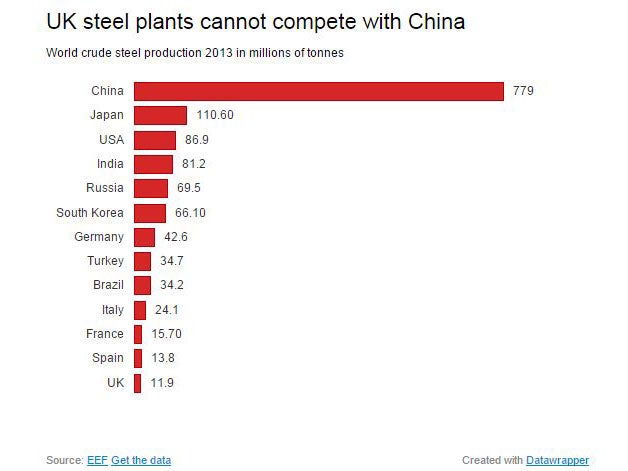Should the UK Government nationalise Tata Steel?
The Big Question: Should the Government step in to save the British steel industry?

Support truly
independent journalism
Our mission is to deliver unbiased, fact-based reporting that holds power to account and exposes the truth.
Whether $5 or $50, every contribution counts.
Support us to deliver journalism without an agenda.

Louise Thomas
Editor
Why are we asking this now?
Tata steel, an Indian steel manufacturer, has said it will sell its loss-making UK business, putting the jobs of thousands of workers at risk.
There are growing calls from the UK Government to prop up the struggling British steel industry from trade unions, think tanks and politicians.
Who’s calling for renationalisation?
Len McCluskey is the general secretary of Unite, which represents tens of thousands of steel and manufacturing workers. He called for renationalisation now so that potential future buyers of the plants can see that the Government is serious about steel manufacturing.
“The unity of voices – from business to government – to say that temporary nationalisation is the way forward must not be ignored. This helped save the Scottish plants. It has ensured that the Ilva plant in Italy survived – it must be deployed for the rest of the Tata operation,” McCluskey said.
Anne Soubry, the Conservative MP for Broxtowe, has said that the Tories aren’t ruling out renationalising Tata Steel but that it could not permanently take it into public ownership because of EU competition rules.
Why?
Tata Steel has lost around £2 billion in five years due to a global glut of steel, caused largely by Chinese steel manufacturers ‘dumping’ excess steel that they cannot sell in China on global markets.

This has pushed the price of steel artificially low. Tata said it too expensive to keep its business in the UK.
Tata's Port Talbot site alone, which employs 5,500 of Tata UK's current 15,000-strong UK workforce, is thought to be losing £1 million a day.
Until the price of steel rebounds – and no one can say how long that will be – the British steel industry needs to be protected or plants like Port Talbot in Wales will go bust within weeks, with a devastating consequences for the local community.
£1 million
How much Tata Steel loses a day
Roy Rickhuss, general secretary of the trade union Community, is one of the union leaders that has been negotiating to keep the plant open with Tata in Mumbai. "We will not let the steel industry in the UK die. We are not going silently into the night,” he said.
How would nationalisation work?
To save Port Talbot, the Government may agree to a part-nationalisation or a temporary nationalisation of the steel works like they did for Royal Bank of Scotland after the financial crisis that almost brought down the banks.
If the Government didn’t want to keep ownership of the plant – as it chose not to with RBS – it might provide incentives to potential buyers, like loan guarantees or agreements with British construction companies obliging them to buy British steel.
It could chose co-operative ownership to support the industry while the steel price recovers.

Tariffs to protect UK steel are a different option as happens in the US. This could involve increasing taxing steel imports outright or indirect tariffs at an EU level.
“It’s worrying that the Government doesn’t seem to support this and hasn’t been doing enough on industrial policy to help the area cope with any unavoidable job losses,” said David Powell, associate director of environment at the New Economics Foundation.
Has Tata Steel been nationalised before?
Most of the plants under threat used to be run by the British Steel Corporation, a government-owned company which was formed in 1967 by merging 14 UK-based steel companies in operation at the time.
A part nationalisation of Tata steel could buy time to look into co-operative ownership
It was privatised again in 1988 under Thatcher. There were huge job losses as British Steel merged with a Dutch steel producer to form Corus Group.
Tata Steel bought Corus in 2007.
Have other industries been successfully nationalised before?
Two recent examples of companies that have been nationalised include East Coast Rail and the banks Lloyds and RBS.
East Coast Rail was taken over by the Government in 2009 when its former owner National Express walked away as revenues fell after the financial crash. The Treasury said that it returned millions in profits during the five years it operated as East Coast.
But the coalition Government ignored calls to keep East Coast in public hands and sold the company to Virgin Trains East Coast in 2015.
Banks Lloyds and RBS had to be part-nationalised after the financial crisis.
David Powell from the New Economics Foundation said that there are parallels with RBS and the steel industry.
The Foundation argued that the Government shouldn’t just nationalise the banks but look at how they could be improved.
“RBS isn’t lending to SMEs or serving local areas – why don’t you turn it into a system of local banks like they did in Germany? Similarly, a part nationalisation of Tata steel could buy time for looking into co-operative ownership,” Powell said.
“Unfortunately the only thing the Government seems to be hoping for is selling it to another big national buyer that may only sell it again two years later.”
Subscribe to Independent Premium to bookmark this article
Want to bookmark your favourite articles and stories to read or reference later? Start your Independent Premium subscription today.
Join our commenting forum
Join thought-provoking conversations, follow other Independent readers and see their replies
Comments